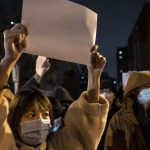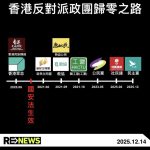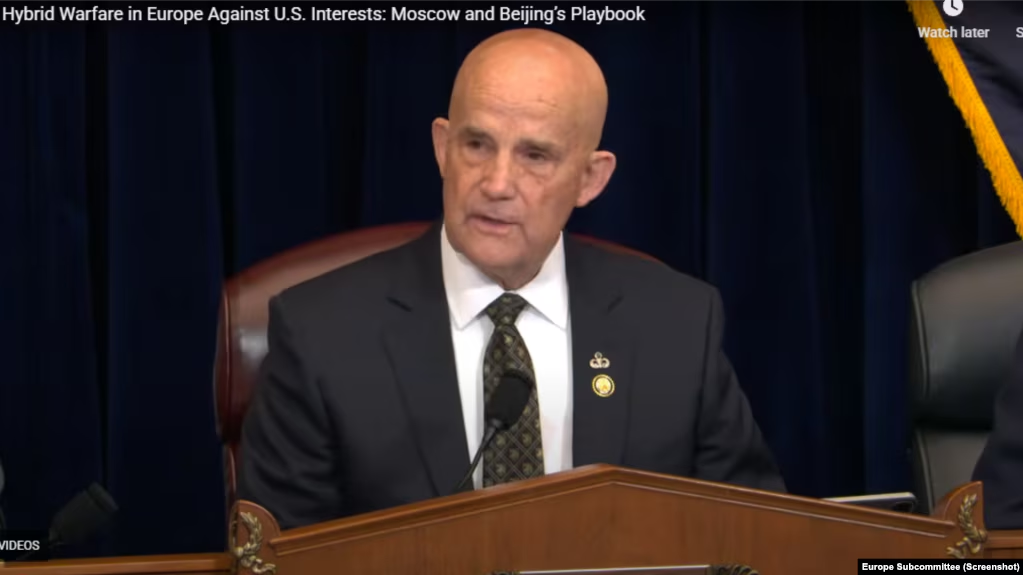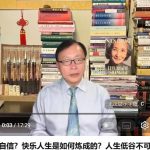(独立中文笔会2023 年 3 月 8 日讯)今天是国际妇女节,美国笔会发起国际笔会等25团体发表联合声明,主题是“中国当局必须释放‘白纸运动’抗议者,允许自由表达新冠疫情”。声明新闻稿全文翻译如下:
在国际妇女节,美国笔会、国际笔会及23 个其他团体呼吁中国政府,释放编辑曹芷馨、作家李思琪、会计师李元婧和教师翟登蕊,并撤销对她们的全部指控。 北京警方逮捕了参加 2022 年 11 月 27 日纪念抗议活动的这四位女性。我们还呼吁中国当局,释放在11-12月“白纸”抗议活动中自由表达而在中国被拘禁的所有其他个人包括许多女性,撤销对他们的全部指控,并终止打压关于新冠疫情的言论。
11月27日,曹芷馨、李思琪、李元婧和翟登蕊等数十名北京市民,参加了在亮马河畔悼念三天前在维吾尔地区乌鲁木齐火灾中遇难者的聚会。这一守夜活动演变成抗议中国政府当时实施“新冠清零 ”政策,并表达了对中国共产党的更广泛不满。它是据报那周末至少 31 城市爆发的抗议浪潮的一部分。抗议两天后的11 月 29 日,北京警方传讯了这四位女性和其他参加者,并没收了手机及其他设备,随后释放了他们。
北京市朝阳区警方反转,12月18日刑事拘留李思琪和李元婧,12月22日拘留翟登蕊,12月23日拘留曹芷馨。警方在那次清查中还拘留了其他人,但后来予以保释。曹在拘留行动开始后录制了一段视频,后于 1 月 16 日由其朋友发布。在视频中,她说其几位朋友被迫在没有列出任何控罪的空白刑事拘留通知书上签字。她还申明了其聚会的动机:“我们关注这个社会”,所做的是作为公民的正常表达。
2023 年 1 月 19 日,这四位女性被控以“寻衅滋事”罪名正式逮捕,而曹芷馨于次日获准首次会见其律师。四人都被关押于北京市朝阳区看守所。 曹芷馨、李思琪、李元婧和翟登蕊的拘留,看来只是为了报复她们参加 了11 月 27 日的抗议活动,以及使用了许多抗议者通常组织的 Telegram 讯息应用软件。她们将面临长达五年的监禁,如果其罪行被认为严重,则将面临十年徒刑。
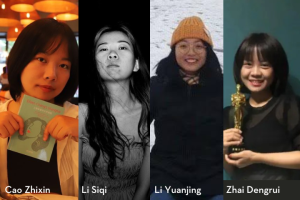
这四位女性都是 20 多岁,没有社会运动背景。朋友们形容她们是女权主义者,具有全球视野,对文学感兴趣,并与社会不公抗争。她们都最近毕业于名牌大学,拥有研究生学位。 曹芷馨作为北京大学出版社编辑,做着“梦寐以求的工作”,李思琪和李元婧都曾留学,而翟登蕊则打算申请去挪威留学。
这四位女性都是 20 多岁,没有社会运动背景。朋友们形容她们是女权主义者,具有全球视野,对文学感兴趣,并与社会不公抗争。她们都最近毕业于名牌大学,拥有研究生学位。 曹芷馨作为北京大学出版社编辑,做着“梦寐以求的工作”,李思琪和李元婧都曾留学,而翟登蕊则打算申请去挪威留学。
2 月 17 日,欧盟呼吁中国政府全部释放这四位女性,申明拘留她们是无视正当程序要求。
这四位女性并无违犯国际法或中国国内法的任何罪行。中国宪法旨在保障言论自由权以及对政府政策的自由表达批评权,而中国政府以刑事诉讼针对曹芷馨、李思琪、李元婧和翟登蕊,侵犯了她们享有国际公认的言论自由权及和平集会权。
以下 25 组织呼吁中国政府,立即无条件释放曹芷馨、李思琪、李元婧、翟登蕊以及所有其他“白纸动动”抗议者,并终止打压关于新冠疫情的自由表达。
(签名按拉丁字母顺序排列)
Access Now
第19条
维吾尔运动
中国人权捍卫者
全球公民社会参与联盟(CIVICUS)
香港自由委员会基金会(CFHKF)
英国笔会
国际人权联盟(FIDH)
自由之家,
乔治城大学亚洲法中心
香港民主委员会
中国人权
人权观察
人道中国
独立中文笔会
查禁目录
国际人权服务社
民间司法改革基金会
中国民主党全国委员会
美国笔会
加拿大笔会
国际笔会
瑞典笔会
维吾尔人权项目
華盛頓人支持香港 (DC4HK)
Chinese Authorities Must Release “Blank Paper” Protesters and Allow Free Expression on COVID-19 Pandemic
(March 8, 2023) On International Women’s Day, PEN America, PEN International, and 23 groups call on the Chinese government to release and drop all charges against editor Cao Zhixin (曹芷馨), writer Li Siqi (李思琪), accountant Li Yuanjing (李元婧), and teacher Zhai Dengrui (翟登蕊). Beijing police arrested the four women for participating in a memorial protest on November 27, 2022. We also call on Chinese authorities to release and drop charges against all other individuals in China detained for freely expressing themselves during the “Blank Paper” protests of November-December, many of whom were women, and to end its suppression of speech about the COVID-19 pandemic.
On November 27, Cao Zhixin, Li Siqi, Li Yuanjing, and Zhai Dengrui and dozens of other Beijing residents attended a memorial on the banks of the Liangma River to commemorate the victims of a fire in Urumqi in the Uyghur region three days prior. The vigil morphed into a protest against the Chinese government’s then-in-place “zero-COVID” policies as well as expressions of broader discontent with the Chinese Communist Party. It was part of a wave of protests in China that broke out in reportedly at least 31 cities that weekend. Two days after the protest, on November 29, Beijing police summoned the four women and other attendees for questioning, and confiscated their phones and other devices. They were then released.
Beijing Chaoyang District police returned and criminally detained Li Siqi and Li Yuanjing on December 18, Zhai Dengrui on December 22, and Cao Zhixin on December 23. Other individuals were detained during this police sweep but later released on bail. Cao recorded a video after the detentions began which was released by her friends on January 16. In the video she said several of her friends were forced to sign blank criminal detention notices that didn’t list any charges. She also asserted the motivations of the group: “We care about society. What we did was a normal expression as citizens.”
On January 19, 2023, the four women were formally arrested on charges of “picking quarrels and provoking trouble,” and the following day Cao Zhixin was granted the first visit with her lawyer. All four are being held at Chaoyang District Detention Center in Beijing. The detentions of Cao Zhixin, Li Siqi, Li Yuanjing, and Zhai Dengrui appear to be solely in retaliation for attending the November 27 protest and using the Telegram messaging app, which many protesters used to organize. They face up to five years in prison, or ten years if their offense is deemed serious.
These four women, all in their mid-20s, had no activism background. Their friends describe them as feminists with global perspectives, an interest in literature, and combating social injustice. They had all recently graduated with postgraduate degrees from prestigious universities. Cao Zhixin worked in a “dream job” as an editor with Peking University Press, Li Siqi and Li Yuanjing had both studied overseas, and Zhai Dengrui had planned to apply to study in Norway.
On February 17, the European Union called on the Chinese government to release all four women, asserting that they had been detained in disregard of due process requirements.
These four women have not committed any offense under international or domestic Chinese law. China’s constitution purports to enshrine the right to freedom of speech and the right to freely express criticism of government policies. By targeting Cao Zhixin, Li Siqi, Li Yuanjing, and Zhai Dengrui with criminal prosecution, the Chinese government is violating their internationally recognized rights to freedom of expression and peaceful assembly.
The following 25 organizations call on the Chinese government to immediately and unconditionally release Cao Zhixin, Li Siqi, Li Yuanjing, and Zhai Dengrui and all other “blank paper” protesters, and to end its crackdown on free expression around the COVID-19 pandemic.
Access Now
ARTICLE 19
Campaign for Uyghurs
Chinese Human Rights Defenders
CIVICUS: World Alliance for Citizen Participation
Committee for Freedom in Hong Kong Foundation
English PEN
FIDH – International Federation for Human Rights
Freedom House
Georgetown Center for Asian Law
Hong Kong Democracy Council
Human Rights in China
Human Rights Watch
Humanitarian China
Independent Chinese PEN Center
Index on Censorship
International Service for Human Rights
Judicial Reform Foundation
National Committee of the Democratic Party of China
PEN America
PEN Canada
PEN International
PEN Sweden
Uyghur Human Rights Project
Washingtonians Supporting Hong Kong (DC4HK)
来源:美国笔会(英文)






